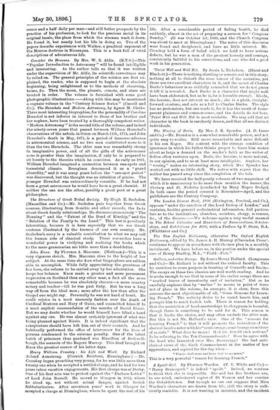Consider the Heavens. By Mrs. W. S. Aldis. (R.T.S.)—This -"Popular
Introduction to Astronomy" will be found intelligible and interesting. As the author tells us that it was written under the supervision of Mr. Aldis, its scientific correctness may be relied on. The general principles of the science are first ex- plained, the reader, who is supposed to begin at the absolute beginning, being enlightened as to the methods of observing, terms, &c. Then the moon, the planets, comets, and stars are treated in order. The volume is furnished with some good photographic illustrations.—Along with this may be mentioned a cognate volume in the "Century Science Series" (Cassell and Co.), The Herschels and Modern Astronomy, by Agnes H. Clerke. Three most interesting biographies, for the personality of Caroline Herschel is not inferior in interest to those of her brother and her nephew, have been treated by a thoroughly competent writer. "Modern Astronomy" is the second title of the volume, and indeed the ninety-seven years that passed between William Herschel's observations of the nebula in Orion on March 11th, 1774, and John Herschel's death in May, 1371, is a period of immense advance in astronomical science, and no two men contributed more to it than the two Herschels. The elder man was remarkably strong in imaginative power, and of all the gifts of the astronomer none i8 greater than the imagination, if only he is prepared to sit loosely to the theories which he conceives. As early as 1801, William Herschel imagined a connection between sun-spots and terrestrial climate. Brougham denounced it as a "grand absurdity," and it was many years before the "sun-spot period" was discovered, but the thought was an intuition of genius. The .younger Herschel was extraordinarily versatile. If he bad not been a great astronomer he would have been a great chemist. If neither the one nor the other, possibly a great poet or a great philosopher.


































 Previous page
Previous page